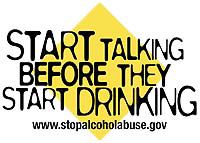On an average weekend in this country, one teenager dies from alcohol related incidents every hour. This figure comes from an HBO reality special called Smashed. It is a docu-drama filmed in actual hospital trauma units, and features cases in which teenagers are critically injured due to alcohol related accidents.
The first story is one of a young man named Timmy. He is brought into the trauma unit with a severely broken leg and extensive head injuries. He later admitted to drinking a case of beer just before jumping on his 4-wheeler to take a ride. A high speed collision with a tree stopped his activities very abruptly.
During the course of the emergency room treatment, his parents arrive at the hospital to see their son as he is about to go into surgery for the broken leg. He is on a ventilator which is helping him breathe, he has severe head injuries, and is unconscious.
Fear and shock cover the faces of Timmy’s family as they await word of his condition. None of the physicians have given them any hope for his survival, let alone recovery. As the first few days pass, Timmy survives the initial trauma, but remains in a coma. There are scenes of a mother, crying, hopeless, trying to sleep in a hospital chair as she is afraid to leave the hospital for fear that she will never see her son again.
Siblings and other relatives come into his room and talk with him while he lies in a coma, hoping that the sound of their voices will rouse him. One afternoon, he moves his legs and the family becomes ecstatic and is overcome with relief. His mother and father were beginning to believe they would get their son back.
They soon came to realize, and are informed by the doctors, that body spasms and leg movements are a normal reaction when someone is in a coma with a brain injury. It does not necessarily mean that the injured person will be OK.
About a week into the coma, Timmy opened his eyes and looked at his mother’s face. Though unable to speak, he seemed to recognize those around him. His family would get their wish for him to live through this tragic accident.
For the next several months, Timmy would go through extensive physical and mental therapy, along with a battery of tests to gauge the amount of brain damage. During this time, Timmy was able to enlighten his mother concerning the day of the accident.
While still unable to verbalize well, he was insistent that he would not quit drinking. He seemed to be unable to connect his present condition with the drinking.
This story was one of many on the video which demonstrated the terrible, lifelong consequences of underage drinking. Without exception, every one of the young people who suffered traumatic injuries will be affected through the remainder of their lives.
One beautiful young woman had suffered so much brain damage from a car accident involving alcohol, that she could not remember what the question was long enough to answer it. Her mother explained that the young woman would never regain her short term memory, thus never being able to live a normal life.
Many of the young people featured in the video had the same kinds of lifelong injuries, some physical, some mental. None of them would be able to hold a job and live normally. Many of the young men who suffered injuries were antagonistic and depressed following the injury. Some were even aggressive to the point of hurting other people, with no control of their actions.
Following the video, the local residents who had gathered for this informational meeting agreed that underage drinking is a very serious problem. One told of his third grader who knows children his own age who are already drinking.
Sgt. Tom Harrison of the Emery County Sheriff’s Office stated, “We here in Emery County seem to think that we are immune to these problems because we live in rural Utah and not a big city, but we have all the same problems here in rural Emery County. Over the years there have been many tragic events due to underage drinking. We have great kids here in Emery County, some who make very bad choices once in a while. We as adults need to do whatever is necessary to reach these kids, and teach them to make better choices.”
What parents need to do: create a positive living home environment; talk early and often with your child; help them become competent and involved; teach children to choose friends wisely; monitor your child’s activities; and help children deal with stress or depression. If you, as an adult, choose to drink alcohol: always drink in moderation; do not use alcohol as an escape from your problems; do not portray alcohol use as fun or glamorous; and keep alcohol locked up and away from children.
Adults need to set “no alcohol” rules. Set clear rules and consequences; be specific; post and review the rules; be consistent; be reasonable; and recognize and reward good behavior.
Forty percent of young people who drink before age 15 will become alcohol dependent as adults. Parents must learn they are the most powerful influence on a child’s behavior. Learn and explain the risks of underage drinking; have daily, positive communication with your children; set clear rules about no alcohol; consistently enforce the rules; monitor your childrens’ activities and stress levels; help them choose friends who support your rules; and ensure that alcohol is not available to your child at home or from friends when your child is away.
Underage drinking town meeting

